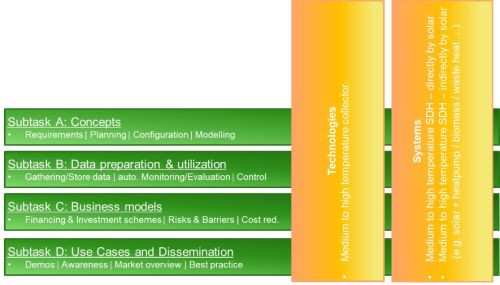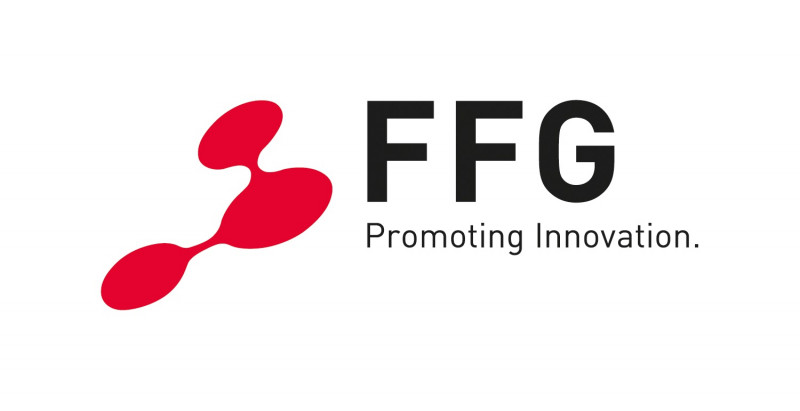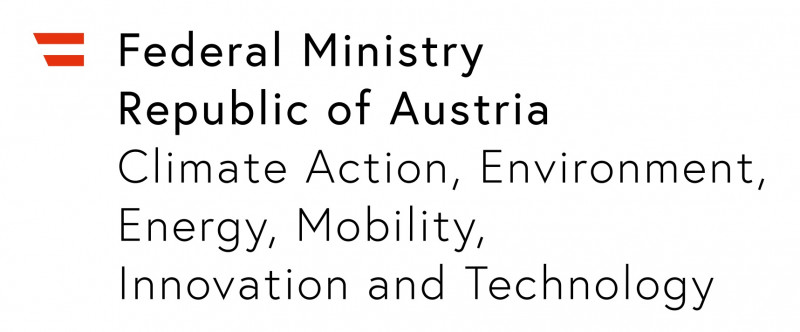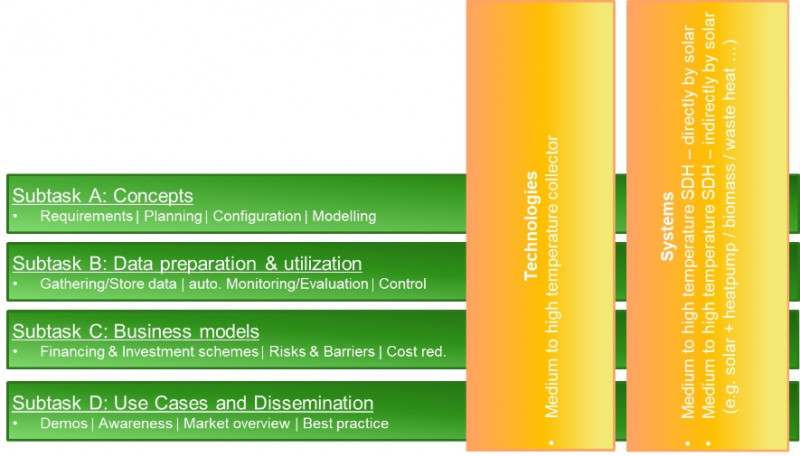IEA SHC Task 68: Effiziente solare Fernwärmesysteme
Das TCP SHC hat sich zum Ziel gesetzt, dass Solarenergietechnologien im Jahr 2050 mehr als 50 % des Wärme- und Kühlbedarfs für Gebäude decken und somit wesentlich dazu beitragen, die CO2-Emissionen weltweit zu senken.
In diesem Zusammenhang wurde bereits der erfolgreich abgeschlossene SHC Task 55 durchgeführt, welcher sich mit den technisch-wirtschaftlichen Parametern und Anforderungen sehr großer solarthermischer Anlagen (>0,5 MW bis GW) beschäftigte. Die Bearbeitung des Themas solarer Nah-/Fernwärmesysteme wird nun im neuen Task 68 – Efficient Solar District Heating Systems fortgesetzt, vertieft und um aktuelle Fragestellungen und Entwicklungen erweitert. Dabei verfolgt der neue Task 4 Hauptziele:
- Effiziente Bereitstellung der Wärme auf dem gewünschten Temperaturniveau von Nah-/Fernwärmesystemen
- Erhöhung des Digitalisierungsgrades solarthermischer Systeme
- Reduktion von Kosten solarer Nah-/Fernwärmesystemen und Identifikation von neuen Geschäftsmodelle
- Schärfung des Bewusstseins und fundierte Dissemination der Ergebnisse zu solaren Nah-/Fernwärmesystemen
Der Task 68 soll dabei eine Plattform für Industrie und Wissenschaft bieten, um die Möglichkeiten, Herausforderungen und Vorteile bzgl. dieser Hauptziele gemeinsam auf internationalem Level und unter der Führung Österreichs zu bearbeiten. Zu diesem Zweck ist der Task 68 in 4 Subtasks gegliedert:

(Subtaskstruktur des internationalen Tasks 68)
Neben der Führung des gesamten Tasks ist auch die Leitung von Subtask B in österreichsicher Hand. Weiters ist eine Vielzahl führender österreichischer Experten aus Industrie und Wissenschaft in das nationale Konsortium eingebunden.
Aus heutiger Sicht soll dabei das österreichische Konsortium beim Erreichen der folgenden Ergebnisse federführend mitwirken:
- Bewertung/Weiterentwicklung der Möglichkeiten zur effizienten Bereitstellung von Wärme auf mittleren bis höhere Temperaturen direkt oder indirekt durch Solartechnologie (z.B. Kopplung mit Wärmepumpen).
- Entwicklung und Bewertung von Anforderungen, Konzepten und Konfigurationen für die optimale Auslegung und Bau solarer Fernwärmesysteme zur effizienten und kostengünstigen Bereitstellung von Wärme auf gewünschten Temperaturen unter Berücksichtigung von saisonalen Speichern.
- Weiterentwicklung und Untersuchung von Testmethoden zur Leistungsbestimmung von verschiedenen Kollektortechnologien in Feld- und Labortests.
- Beschreibung und Erhebung effizienter Lösungen zum Sammeln, Speichern und Verteilen von Daten aus heterogenen Geräten auf Einzel- u. Multi-Anlagenebene.
- Entwicklung von Kriterien, Richtlinien u Maßnahmen für die Validierung von Daten aus solaren Fernwärmesystemen sowie Erhebung, Zusammenfassung und Bewertung von Techniken zur Analyse, Überwachung und Fehlererkennung von solaren Fernwärmesystemen.
- Vergleich und Bewertung von fortschrittlichen Regelungsstrategien auf Komponenten- (z.B. Kollektorregelung) und Systemebene (z.B. Gesamtsystemregelung).
- Workshops und Vorträge für Industrie- und wissenschaftliche Experten zu Task-Ergebnissen
Projektlaufzeit
2022-01-01 - 2025-03-31
Finanzierung
Dieses Projekt wird im Rahmen der IEA-Forschungskooperation im Auftrag des Bundesministeriums für Klimaschutz, Umwelt, Energie, Mobilität, Innovation und Technologie durchgeführt.
Projektpartner






Ansprechperson – Projektleitung:
Viktor Unterberger (Task Leader) BEST
AEE - Institut für Nachhaltige Technologien
AIT Austrian Institute of Technology GmbH
SOLID Solar Energy Systems GmbH
Universität Innsbruck Institut für Konstruktion und Materialwissenschaften
Teilnehmende Staaten: China, Dänemark, Deutschland, Italien, Niederlande, Österreich (Leitung), Schweden, Schweiz, Spanien, Türkei
Ansprechperson

Klaus LICHTENEGGER
klaus.lichtenegger@best-research.eu
Area Management

Markus GÖLLES
markus.goelles@best-research.eu
Publikationen
IEA Cross TCP Workshop: Towards a flexible, cross sectoral energy supply
IEA SHC Task 68: Efficient Solar District Heating Systems
Efficient Gathering, Storing, Distributing and Validation of Data
On efficient solar district heating systems – status and latest results
Predictive Rule-Based Control Strategy for Optimizing the Operation of Solar District Heating Plants
